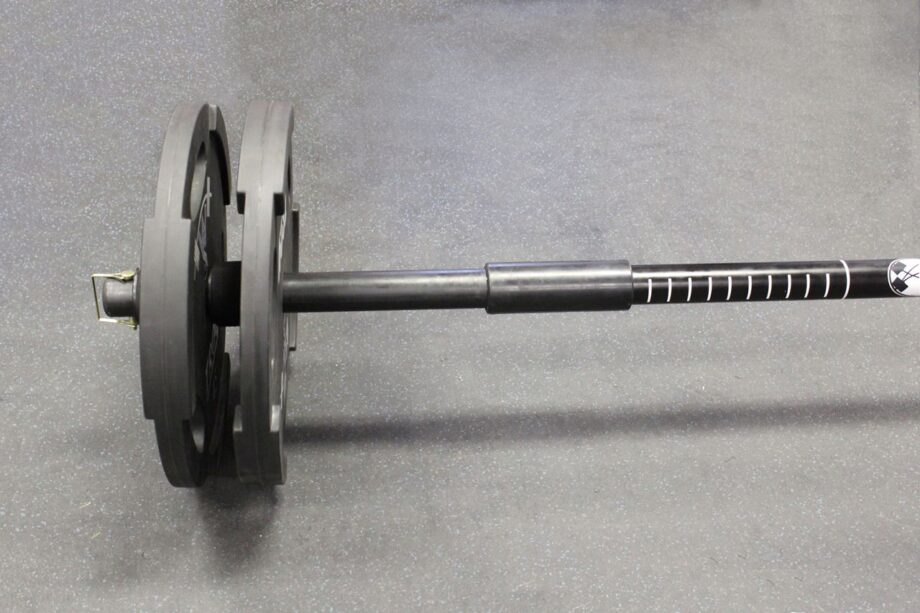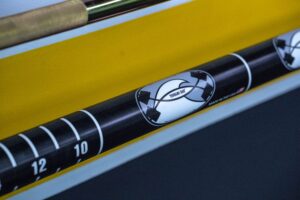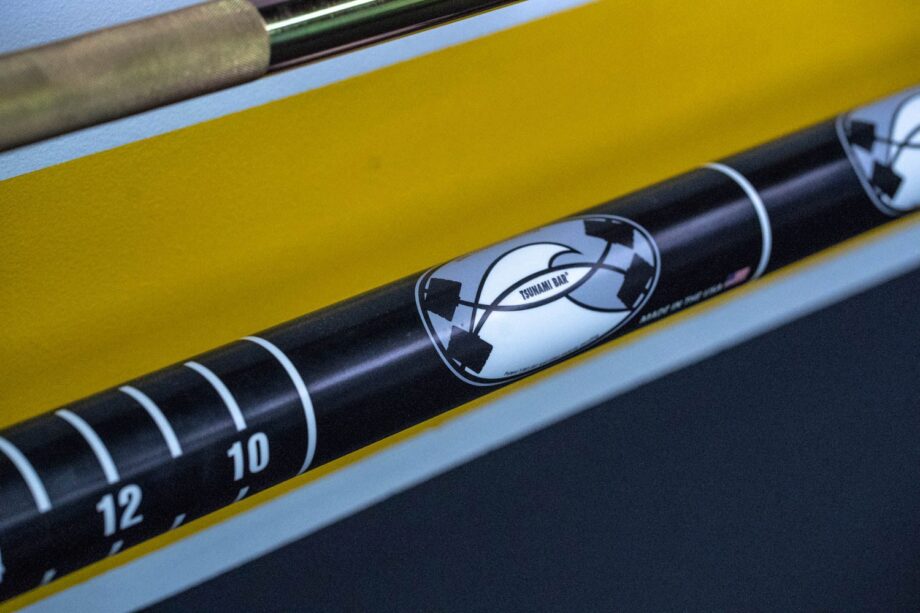We test and review fitness products based on an independent, multi-point methodology. If you use our links to purchase something, we may earn a commission. Read our disclosures.
The Tsunami Barbellis one of the most unique barbells currently being manufactured. Rather than being rigid like most bars, the Tsunami Bar is manufactured with the intention to be as whippy as possible. Based upon our testing as well as published studies, we believe the Tsunami Bar does what it claims: increase force production.
Tsunami Barbell
Tsunami Bar – Level 3

Product Highlights
The LEVEL 3 Tsunami Bar® (Black Label) may accommodate up to three 45-lb plates on each end of the bar. This bar also includes two sets of Croc Lock collars.
Pros & Cons
Bottom Line
Tsunami Barbell Review
The Tsunami Barbell is no ordinary barbell. It doesn’t look like a barbell (other than the fact that it’s straight and long) and it certainly doesn’t perform like a barbell. But, at least according to the creators, it should be able to outperform barbells in many areas.
Before I get into the build and performance of the bar, I want to discuss what it’s made for and whether their claims are actually substantiated.

The Tsunami Bar is designed to be used to “train for force and speed with the same bar, which develops power and power is the foundation of athletic performance in most sports.” In other words, although it can be used by the general public, its initial design was so it could be used for athletics, most notably football. In addition to its use in sport’s training, it’s also suggested to be used as training for the bench and squat for powerlifting.

Although there is a ton of information on the Tsunami Bar website, I’ll be the first to say it is a bit difficult to navigate and read. However, after scrolling and clicking through just about every link I could find, I’ve come away with a good idea for the purpose of the bar.

The Tsunami Bar is not designed to replace traditional steel barbells. Although I’m sure they would love to sell so many Tsunami Bars that steel barbells were done away with, they recognize that the traditional barbell is still very much-needed in training.

In fact, in a discussion with Rob Thames (Tsunami Bars Marketing Head) he informed me that he did not suggest people get rid of their barbells in favor of the Tsunami Bar. This is what he had to say, “I am not suggesting everyone trash their steel barbells. Steel bars, Tsunami Bars, camber bars, Swiss bars, axle bars, etc. are all tools in the toolbox, and each should be used in an effort to elicit different muscle recruitment patterns, motor neuron firing, CNS response, etc.”
I really liked this response. Too many companies that come out with a “revolutionary” idea feel as if everything should be given up in favor of their new tool. This simply isn’t so in the majority of cases, and certainly not for the Tsunami Bar.

The creatorsof the Tsunami Bar are not reliant solely upon marketing language. Going through their site, it would sometimes seem like that, however, they have various independent studies that do prove the effectiveness of the Tsunami Bar.
For instance, in this study, it was determined that the Tsunami Bar generated significantly greater forces than an Olympic Barbell due to the “flexible nature of the Tsunami Bar allowing for greater force production.” This study was done using varsity footballplayers performing the bench press (the movement I feel in our tests was best suited for the Tsunami Bar.)

In addition, Tsunami Barbell has a chart showing the “Measured Dynamic + Static Reaction Forces during Oscillatory Machine Testing.” In other words, they strapped two bars to a machine that oscillated up and down and measured the reaction forces. Due to its oscillatory characteristics, it was determined that the Tsunami Bar increased the “total forces” dramatically compared to an Olympic Barbell.

All of this is to say, there is evidence to suggest that the Tsunami Bar does what it claims: allow greater force production than a standard Olympic Barbell.
Now that we’ve determined the bar is more than just a gimmick, let’s take a look at its build.
The Tsunami Bar is 90″ long and 3″ in diameter. You read that right, it has a diameter of 76mm which is almost three times the size of a standard Olympic Barbell. This fact, along with its oscillating properties is the reason the bar isn’t used for things like deadlifts and other pulling movements. The 3″ diameter feels great for benching, overhead pressing, as well as squats, however.

The bar itself feels like a really high-quality PVC pipe, however, it’s much more than that. The Tsunami Bar is made of a patented composite and thermoplastic material that’s both flexy and incredibly durable. Seriously, after talking to Rob at Tsunami Bar, it became apparent that there isn’t much this bar can’t take.

Due to the pliability of the material when a loaded Tsunami Bar is placed over the upper back and shoulders, the degree of direct axial spinal load is greatly reduced to its parabolic bend in the bar. Rather than the load being stacked on your spine, the perceived load is displaced towards the end of the bar where the plates are. This transfers the engagement from the axial spine to the sagittal plane. For this reason, the Tsunami Bar can actually be used for various plyometric movements where an Olympic Barbell would crush you.

On the end of the bar are two Croc Lock Collars. These collars can be used for barbells, but are specially designed for the Tsunami Bar.
The way the collars work is you leave one on the inside, closest to the “shaft” of the bar, place the weight plate on, put the outside collar on (which has a metal pin to secure the plate on), and then slide the inside collar to sandwich the weight between the two collars.
They’re easy to install and the velcro holds them tight (although I am worried the velcro could wear out over time.

The Tsunami Bars we received for review are the Level 3 and the Light-Plus – Standard Grip. The Level 3 is their most popular bar while the Light Plus has a 1.25″ diameter that is closer to what most peopleare used to. The Level 3 Tsunami Bar can be loaded up to 135 lbs on each end of the bar (although I don’t see any issues adding more) and the Light-Plus can be loaded up to 102 lbs total.

One thing that I feel needs to be mentioned is the vast amount of products that Tsunami Bar offers. Having only been introduced in 2012, it’s crazy the amount of variations Tsunami Bar has brought to market. However, although there are many available for purchase, it’s difficult to navigate and decide which bar to choose.

Here areTsunami Bars that are sold through various retailers (these don’t include LAT Bars,Rollers, Handles or any of their other products):
- Tsunami Bar Light – Standard Grip
- Tsunami Bar Light-Plus – Standard Grip
- Tsunami Bar Ultra-Light – Standard Grip
- Tsunami Bar LIGHT Plus
- Tsunami Bar Camo
- Tsunami Bar Ultra-LIGHT
- Tsunami Bar LIGHT
- Level 1 Tsunami Bar
- Level 3 Tsunami Bar
- Level 5Tsunami Bar

See what I mean? How do you decide which one to choose? Well, we’d like to have all of them in house to tell you which ones are best for certain applications, but at this time, we’d probably suggest that most of our readers stick to the Level 3 Tsunami Bar. It’s going to be able to handle the weight you’re likely to use with the bar and it’s going to be the most versatile.
On the shaft of the bar is a big sticker. If you’ve read any of our reviews then you likely know how big a fan of stickers we are (we’re not) and this was actually a disclaimer Rob (Tsunami Marketing Head) gave saying, “the bar is covered in a sticker, it’s the best way we’ve figured out how to add grip and brand the bar.”

The sticker does help for evening up hand placement, and doesn’t provide too bad of a grip. My main worry with it is that it will wear over time and end up looking less than attractive. I suggest using Cerakote. I’m not sure how it sticks to plastic, but It would allow for a lot of color as well as various markings.

In regards to performance, I’m actually a believer. Do I think it should replace a steel barbell? No, of course not. But, I do believe it’s a worthwhile tool to add to your specialty bar arsenal.
I found myself using it for bench sets as accessory work instead of the bamboo bar (these two bars are very different and would be an apple to orange comparison.) We’ve also used it with some of our athletes at the gym for various plyometric exercises and bounding. Some of our elderly clients like it as well because they find it less jarring on their joints.

We were suggested to use the bar for power cleans, but to be honest, I didn’t like it for that purpose. It was too hard to control (that may be the training effect) and I was worried about injury.
In conclusion, we see the usefulness of the Tsunami Bar. I believe many different strength programs would be benefited by their use and we’re excited to continue to test the bar in various ways.
Suggested Improvements
Although we believe in the effectiveness of the Tsunami Bar, there are a few things we’d like to see improved.
First off, their product catalog needs to be simplified. That can be done by minimizing the number of variations or having an easier to navigate and understand database of bars.

The next improvement would be to get rid of the sticker and come up with a more permanent branding solution. The sticker, in my opinion, makes a high-end product look cheap. It would also be cool to have the option to customize the bar for large D1 and professional programs.
Another improvement would be to knurl the bar. The bar is already so thick that any pulling movements with it is difficult, but knurl would increase the ability to grip it while also being familiar in the hands of most trainees.
Finally, there needs to be more in-depth tutorial videos on how to properly use the bar. Although Tsunami Bar has videos, many are too short and not as professionally done as a product like this really needs. This would not only attract new customers, but help current customers get the most out of their bars.
Workouts

In testing, there were a few workouts we liked that we’d suggest anyone with the bar give a shot.
This one was our favorite and was courtesy of Rob Thames:
This is a spinoff of some of the Westside principles, and I usually do this routine putting two or three moves together and take almost no rest in between sets. Just enough to change weight or get water and back at it.
Tsunami Bar Bench Press – Superset with – Lat Pulldown and Ab Wheel
Sets 1 & 2
Bench: Weight 45 per side x Reps 5x5x5
Lat PD: Weight 140 x Reps 12
Ab Wheel: Body Weight x Reps 15
Sets 3 & 4
Bench: Weight 60 per side x Reps 4x4x5
Lat PD: Weight 160 x Reps 12
Ab Wheel: Body Weight x 15
Sets 5 & 6
Bench: Weight 75 per side x Reps 3x3x5
Face Pull: Weight 60 (guessing here. Depends on the cable machine) x Reps 12
Hanging Leg Raise x 10
Sets 7 & 8
Bench: Weight 90 per side x Reps 2x2x5
Face Pull: Weight 65 x Reps 12
Hanging Leg Raise x 10
Set 9
Bench: Weight 105 per side x 2 (this is just down and up with no speed criteria)
Set 10
Bench: Weight 120 per side x 2
Set 11
Bench: Weight 135 per side x 1
Set 12
Bench: Weight 75 per side x MAX REPS (Steady pace. Goal 20 … Cap at 24)
Tsunami Bar Power Clean/Press – Superset with – Upright Row (cable) and Triceps Pushdown
(Use the Tsunami Bar SG Light Plus. PC from the floor and after the catch perform 5 explosive presses … that equals 1 rep. One set will include 5 PC and 15 presses total)
Three times through the following combination (keep rest to a minimum)
Power Clean/Press: Weight 45 per side x Reps 5
Upright Row: (use cable machine w/ D Handles or Utility Strap) Weight 60/65/70 x Reps 12
Triceps: Pushdown (pick your weight) x Reps 15
Tsunami Bar Pullover – Superset with – Triceps DB Extensions and Tsunami Bar Biceps Curl
(Use the SG Light Plus for the Pullovers. Lie on bench w/ bar over chest, grip inside shoulder width, and elbows slightly bent. Execute pullover move with full stretch and return to start position. No speed criteria on this move. For the Biceps curl use the same SG Light Plus bar)
Three times through the following combination (keep rest to a minimum)
Tsunami Bar Pullover: Weight 45 per side x Reps 12
Triceps DB Extension: Weight (you select) x Reps 12
Tsunami Bar Biceps Curl: Weight 45 per side x Reps 12 (finish off with a couple extra sets of biceps if needed)
Full Rating
Tsunami Barbell

The Tsunami Barbell is one of the most unique barbells currently being manufactured. Rather than being rigid like most bars, the Tsunami Bar is manufactured with the intention to be as whippy as possible. Based upon our testing as well as published studies, we believe the Tsunami Bar does what it claims: increase force production.
Product Brand: Tsunami Barbell
Product Currency: USD
Product Price: 649
Product In-Stock: InStock
4.3
Where to Purchase
William
Tsunami Bar – Level 3

Product Highlights
The LEVEL 3 Tsunami Bar® (Black Label) may accommodate up to three 45-lb plates on each end of the bar. This bar also includes two sets of Croc Lock collars.
Pros & Cons
Bottom Line
Tsunami Barbell FAQs
What does a tsunami bar do?
During the lift, the Tsunami Bar flexes and oscillates, recruiting additional muscles. Lifters may safely develop more explosiveness without utilizing as much weight because of the extra elasticity.
What is a tsunami bar made of?
For starters, it’s composed of a flexible fiberglass composite rather than steel. When weights are added to either end of the bar, it bends, and the resistance placed on an athlete’s muscles rises as the bar is pushed faster.
Who invented the Tsunami bar?
David Abernathy and Gordon Brown created the first prototype of the Tsunami Bar in 2012. Abernathy was a strength and conditioning coach at Clemson University at the time.
Further reading

The Angles90 Grips are one of the hottest fitness items on social media right now. Our Angles90 Grips review will determine whether they’re worth it or not. Read more

The best natural pre-workout supplements give you a pump and an energy boost without artificial ingredients and sweeteners. Read more

Trying to follow a healthier lifestyle without breaking the bank? In this article, we’ll show you how to eat healthy on a budget. Read more

HIIT rowing workouts are a quick and effective way to improve your cardiovascular endurance, stamina, and overall health and fitness. Read more

